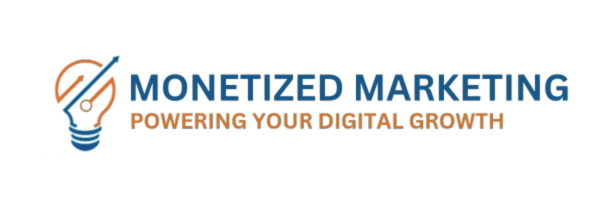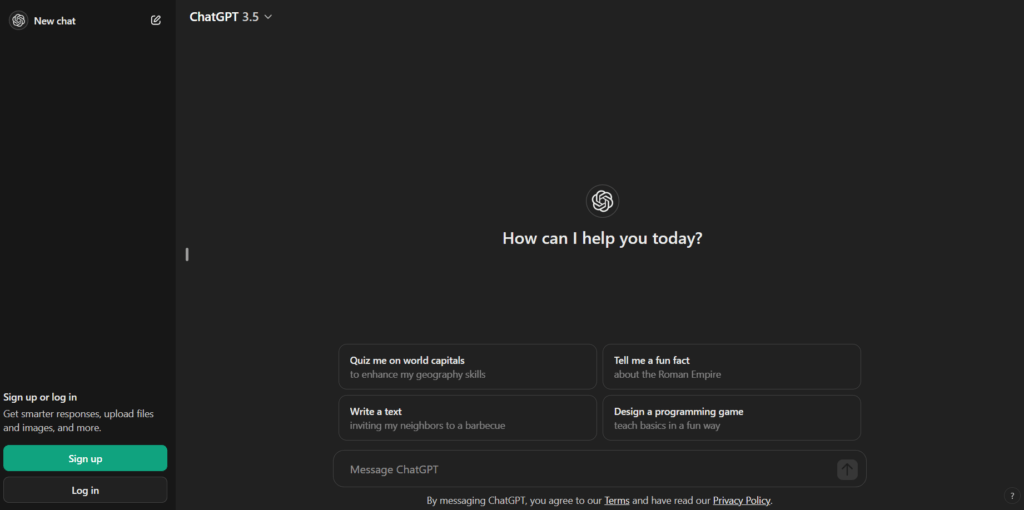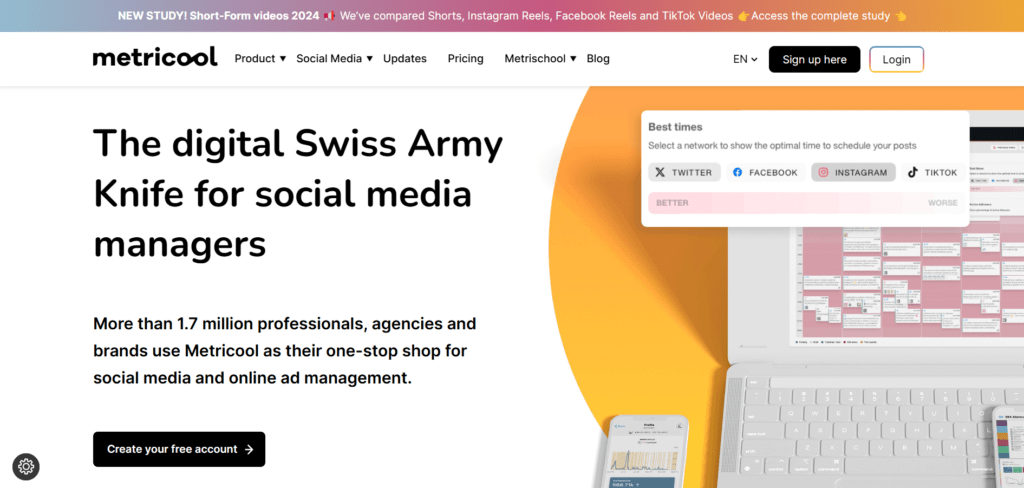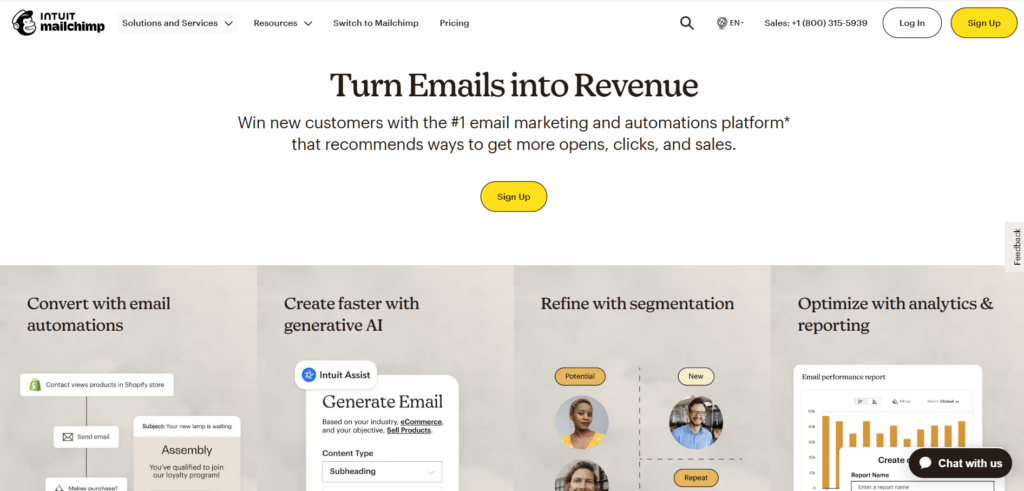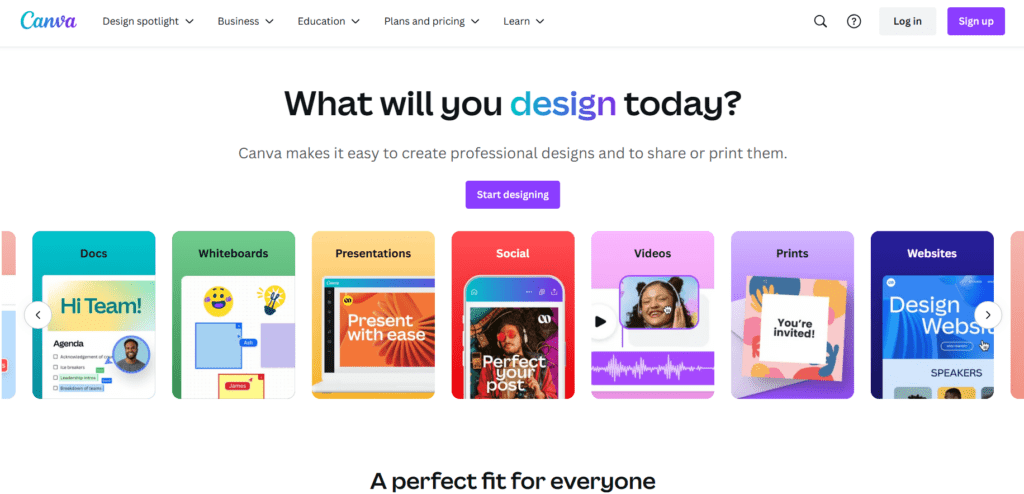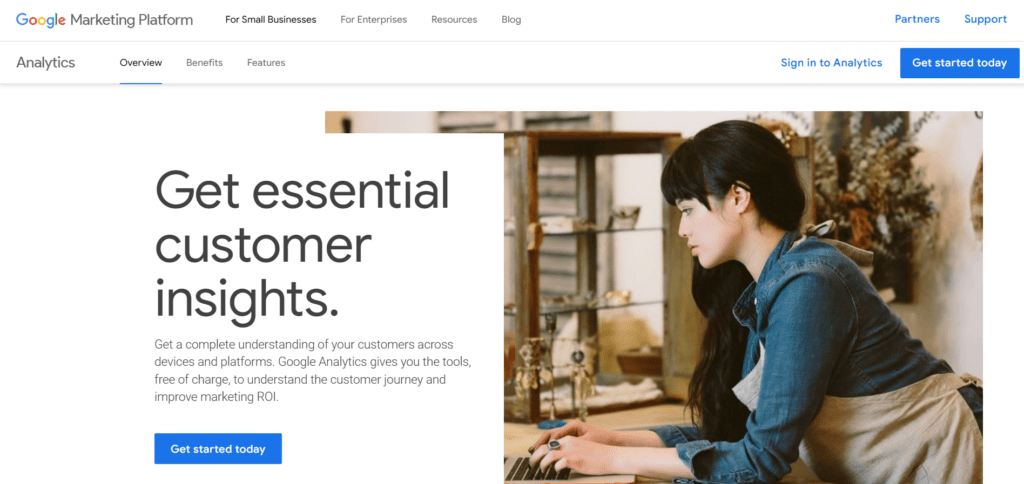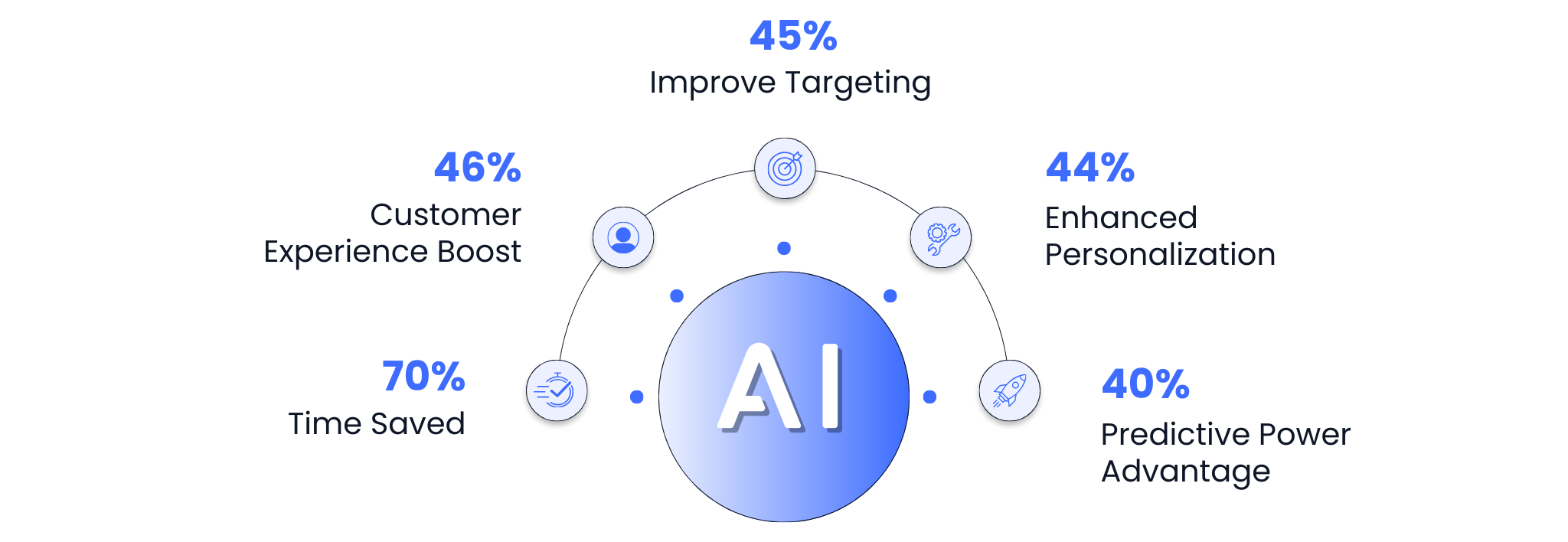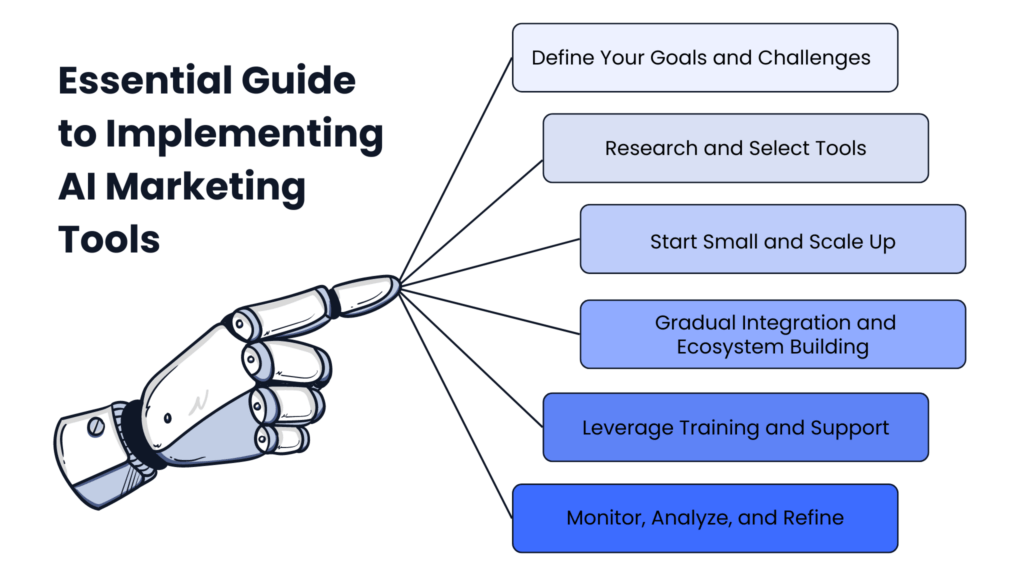
Did you know that a recent study by CompTIA shows a significant increase in AI marketing adoption? The report indicates that over 64% of B2B marketers consider AI valuable in their marketing strategies. As a small business owner, can you afford to miss out on this marketing revolution?
Can Your Small Business Keep Up?
Running a small business is a thrilling ride, but it can also feel like a constant battle against limited resources and time. As a result, creating engaging content, managing social media effectively, and keeping up with the latest trends can be overwhelming.
What if there was a solution that could automate tasks, personalize your marketing efforts, and gain valuable customer insights – all without sacrificing your precious time or stretching your budget thin? This solution is AI marketing.
What is AI Marketing?
AI marketing is the exciting new frontier where artificial intelligence technologies are harnessed to streamline and optimize your marketing efforts. Specifically, AI can automate repetitive tasks like scheduling social media posts or generating email campaigns. Additionally, it can personalize customer experiences by delivering highly targeted content recommendations and special offers. The result? Improved efficiency, increased customer engagement, and a significant boost to your marketing ROI (Return On Investment).
Challenges Small Businesses Face
Marketing can be a challenging landscape for small businesses. Time constraints from juggling multiple roles can leave little time for strategic planning. Furthermore, personalizing marketing efforts with limited resources is a struggle. Tight budgets and minimal manpower can hinder the development of complex marketing plans.
However, there’s a solution to these challenges – affordable AI marketing tools tailored for small businesses.
The Benefits of AI Marketing Tools
These powerful yet affordable tools offer a range of benefits that directly address the pain points faced by small businesses:
First, they can streamline your workflow by automating repetitive tasks like scheduling posts, generating content, and analyzing data. This allows more time to focus on strategic tasks.
Second, AI tools enable true personalization by analyzing customer data to understand preferences, allowing you to tailor content, offers, and interactions.
Moreover, these tools provide data-driven insights by analyzing large datasets to identify trends, understand your audience, and measure campaign effectiveness.
Finally, affordable AI gives small businesses access to capabilities previously reserved for larger companies with bigger budgets. You can now create professional content, personalize marketing, and leverage data insights cost-effectively.
5 Affordable AI Marketing Tools for Small Businesses
To help take advantage of these benefits, here are 5 affordable AI marketing tools worth considering:
- ChatGPT for Content Creation & Management
- Metricool for Social Media Marketing
- Mailchimp for Email Marketing Automation
- Canva for Design & Creativity
- Google Analytics for Data Analytics & Reporting
Content Creation & Management: ChatGPT
ChatGPT is a cutting-edge AI content creation tool designed to assist small businesses in overcoming writer’s block and streamlining content production.
It utilizes artificial intelligence to generate creative content ideas and outlines for various formats, including blog posts, social media captions, website copy, scripts, etc. This allows small businesses to consistently publish fresh and engaging content without the need for a dedicated content writer.
Social Media Marketing: Metricool
Metricool is a comprehensive social media management platform with integrated AI features that streamline social media marketing for small businesses.
It offers scheduling functionalities to publish posts across various platforms in advance, freeing up valuable time. Its AI capabilities analyze social media performance, offering valuable insights into the content that most engage your target audience. Additionally, Metricool allows you to track competitor activity on social media, allowing you to keep up with shifting trends and adapt your strategy accordingly.
Email Marketing Automation: Mailchimp
Mailchimp is a user-friendly email marketing platform equipped with AI capabilities that empower small businesses to create targeted and effective email campaigns.
Its AI capabilities enable you to segment your email list based on demographics, interests, and past behavior. This allows for highly personalized email communication that resonates with individual subscribers. Additionally, Mailchimp facilitates A/B testing of different email components such as call-to-action buttons, content, and subject lines. By analyzing the outcome it allows you to improve your email campaigns for maximum impact and improve conversion rates.
Design & Creativity: Canva
Canva is a graphic design platform with built-in AI features that empowers small businesses to create professional-looking marketing materials without needing design expertise.
It offers a wide collection of pre-made templates for different marketing materials, including social media graphics, presentations, infographics, and more, all within a user-friendly interface. Canva’s AI features can assist with design creation by suggesting layouts and color palettes based on your chosen topic or brand guidelines. Additionally, Canva offers a smart image resizing tool, ensuring your designs perfectly fit across various social media platforms with specific size requirements.
Data Analytics & Reporting: Google Analytics
Google provides small businesses with a free web analytics tool called Google Analytics, which allows them to monitor user behavior and website traffic.
It offers useful insights into website performance by determining where users come from, what pages they view, and how long they stay engaged. In addition, you can assess the performance of your marketing campaigns by monitoring conversions such as sales and signups generated by specific marketing efforts. Leveraging these Google Analytics data insights, small businesses can improve their marketing strategy and website optimization by making data-driven decisions.
While Google Analytics may appear complicated at first glance, there are plenty of free online tools and tutorials available to help you get up and running with this efficient tool.
The Impact of AI Marketing Tools on Small Businesses
A recent survey by DMI revealed that small businesses leveraging AI marketing tools experience significant benefits. Here are some key findings:
- Nearly 70% reported automated tasks freeing up valuable time. Imagine the possibilities if you could reclaim hours spent on repetitive tasks!
- Nearly half (46%) saw a boost in customer experience. Personalized marketing efforts lead to happier customers, which is essential for business growth.
- Targeted marketing and segmentation also improved for nearly half of respondents (45%). Reaching the right audience with the right message is key to success, and AI tools can help you achieve that.
- Personalization efforts were enhanced for 44%. Speaking directly to your customers’ needs fosters stronger relationships and loyalty.
- Almost 40% reported the value of predictive analytics. AI can help you anticipate customer behavior and tailor your marketing accordingly.
How Small Businesses Leverage AI Tools for Marketing
To illustrate the tangible benefits of AI marketing tools, let’s look at a few real-world examples of small businesses that have successfully integrated AI into their marketing strategies.
Local Boutique: Personalized Customer Engagement
A local boutique in Austin, Texas, faced challenges in engaging their customers consistently. By implementing Mailchimp’s AI-powered email segmentation and personalization features, they created highly targeted email campaigns. These campaigns included personalized product recommendations and exclusive offers based on customers’ purchase history and preferences. The result? Over a six-month period, email open rates increased by 30%, and sales increased by 20%.
Family-Owned Restaurant: Social Media Success
A family-owned restaurant in Chicago utilized Metricool for their social media marketing. By scheduling posts in advance and analyzing performance data, they identified the types of content that resonated most with their audience. Additionally, they monitored competitors to stay ahead of local dining trends. This strategic use of AI led to a 40% increase in their social media following and a 25% rise in reservations.
Online Craft Store: Efficient Content Creation
An online craft store faced difficulties in maintaining a steady stream of engaging content. By using ChatGPT, they generated creative blog post ideas, social media captions, and product descriptions. This AI tool helped them maintain a consistent online presence without the need for a dedicated content writer. As a result, their website traffic increased by 35%, and they saw a 15% uptick in online sales.
Implementing AI Marketing Tools
Integrating AI marketing tools into your business doesn’t have to be difficult. Here’s a roadmap to guide you through the process:
1. Define Your Goals and Challenges
Start by pinpointing your specific marketing goals (e.g., content creation, lead generation, customer engagement). Then, identify the challenges you’re currently facing. This alignment exercise will help you choose AI tools that directly address your needs.
2. Research and Select Tools
Don’t just focus on advertised features. Look for functionalities that seamlessly integrate with your existing marketing stack (CRM, email marketing platform, etc.). Utilize free trials to test the user interface and ensure a smooth workflow.
Pro Tip: Explore industry publications and case studies to understand how other businesses leverage similar tools to achieve their marketing goals. This will help you identify potential value beyond the advertised features.
3. Start Small and Scale Up
Begin with one AI tool that aligns with your most pressing need. For example, if boosting content creation is your priority, start with a content generation tool. This allows you to familiarize yourself with AI capabilities and measure its impact on your marketing efforts before scaling up.
4. Gradual Integration and Ecosystem Building
Once comfortable with the first tool, consider adding another that complements its functionalities. Imagine an AI-powered content creation tool working alongside an email marketing platform with AI-driven personalization features. This creates a cohesive ecosystem that maximizes efficiency.
5. Leverage Training and Support
Don’t underestimate the value of training resources and customer support offered by AI tool providers. Many platforms offer tutorials, webinars, and customer service to help you unlock the full potential of their features.
6. Monitor, Analyze, and Refine
Track and evaluate your AI tools’ performance on a regular basis. Then, use data-driven insights to refine your marketing strategy and continuously adjust your approach to maximize the benefits of AI
By following these steps and focusing on the learning points throughout the process, you’ll be well-equipped to implement AI marketing tools and achieve remarkable results for your business.
The Future of AI Marketing: A Game Changer for Small Businesses
While AI technology might seem out of reach for small businesses, a new wave of affordable tools is making it more accessible than ever. But what does the future hold for AI marketing, and how can small businesses leverage these upcoming trends?
Hyper-Personalization at Scale
Imagine delivering personalized marketing messages to each individual customer, understanding their needs and preferences in real-time. This is the power of hyper-personalization, and AI will be the key to achieving it. Advanced AI algorithms will look at massive amounts of customer data, going beyond demographics to predict behavior and tailor content, offers, and recommendations with precision.
AI-Powered Content Creation and Curation
Small businesses often struggle to consistently produce high-quality content. However, AI is poised to revolutionize content creation. AI tools will not only assist with generating ideas and outlines but also craft compelling content in various formats, from blog posts to social media captions. Additionally, AI will curate content from various sources, ensuring your marketing materials are fresh, relevant, and engaging.
The Rise of Conversational AI and Chatbots
AI-powered chatbots and conversational AI will continue to grow, providing round-the-clock customer service, answering questions, and resolving issues. This will offer a smooth and customized customer experience while freeing up human resources for other important tasks.
Predictive Analytics for Proactive Marketing
AI’s ability to analyze vast datasets will allow for powerful predictive analytics. Businesses can anticipate customer behavior, predict future trends, and proactively tailor their marketing strategies. This will enable small businesses to stay ahead of the curve and reach the right audience with the right message at the right time.
Democratization of AI Marketing Tools
As AI technology advances, we can expect more options for affordable and user-friendly AI marketing solutions tailored to small businesses. These tools will require minimal technical expertise and integrate seamlessly with existing marketing platforms, making AI marketing accessible to everyone.
The Future of Marketing is Smart and Affordable
The five AI marketing tools we explored are just a glimpse into the exciting possibilities AI offers for small businesses. By implementing these affordable tools, you can automate tasks, personalize your marketing efforts, and gain valuable customer insights – all without breaking the bank.
Remember, AI is a powerful tool, but it’s your strategic direction and understanding of your target audience that will ultimately drive success. So, embrace the future of marketing, leverage the power of AI, and watch your small business thrive!
